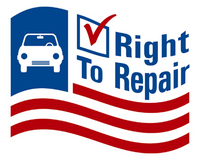Witnesses Make the Case for Right to Repair
BETHESDA, MD--March 16, 2011: Supporters testified Oregon Right to Repair legislation is essential to preserve consumer choice, ensure motorist safety and provide access to quality repairs in rural areas. A large contingent of supporters watched as House Bill 3243 received its first hearing March 14 the Oregon House Business and Labor Committee.
Marie Dodds, representing AAA/Oregon, expressed support for HB 3243, calling it critical to consumer choice in auto repairs. Dodds said Right to Repair legislation also addresses safety concerns when motorists are unable to get repairs in rural parts of the state and must travel long distances to reach franchise dealers.
"There is no greater frustration than having your car broken down and being unable to get it fixed in a timely manner without adding unnecessary expenses such as towing to another town because there is no dealership nearby," said Scott Asla of Baxter Auto Parts in Bend, a family-owned, Oregon-based auto parts company.
Bob Anderson, president of AJ's Auto Repair in Salem, described an "information hole" that can prevent independent auto repair shops from completing repairs. "HB 3243 is designed to bring about a solution to the problem," Anderson said. "It will help us fill the information hole."
Ken Brown, whose family operates a Les Schwab tire store in Newport, said a new federal mandate requires newer model cars to contain a sensor alert for low tire pressure. "We can inflate the tires, but for a lot of models we cannot turn off the sensor light," Brown said. "That forces motorists to go to a dealer just to have the sensor light turned off."
Jon Bartholmew of the Oregon State Public Interest Group called HB 3243 pro-consumer legislation. He said people who buy or lease a car should control the diagnostic information generated by on-board computers.
"They should control that information, not car manufacturers," Bartholomew said.
Barbara Crest, executive director of the Northwest Automotive Trades Association, the largest trade group for independent auto repair shops in Oregon, said the NATA board unanimously endorsed passage of Right to Repair legislation. "We view this as crucial to our future," Crest testified, "as cars become more sophisticated, with more on-board computers."
Economic Fairness Oregon, a consumer advocacy group, submitted supportive testimony. "HB 3243 would give consumers the freedom to entrust their automobile repairs to their local, independent repair shop." Angela Martin of EFO said the legislation is needed because Oregon motorists are facing "increasing costs and fewer options close to home as automobile dealership close down."
Rep. Jason Conger, R-Bend, a member of House Business, pinpointed the problem as car manufacturers withholding key information needed to effect auto repairs, which he said can pose a restraint of trade.
About Right to Repair:
The Motor Vehicle Owners' Right to Repair Act protects motoring consumers from a growing and potentially hazardous vehicle repair monopoly by requiring that vehicle manufacturers provide full access at a reasonable cost to all non-proprietary service information, tools and safety-related bulletins needed to repair motor vehicles. The legislation provides car companies with strong protections for their trade secrets, only requiring them to make available the same diagnostic and repair information they provide their franchised dealers to the independent vehicle repair market. For more information about the Right to Repair Act, visit Right to Repair.
SOURCE Automotive Aftermarket Industry Association



